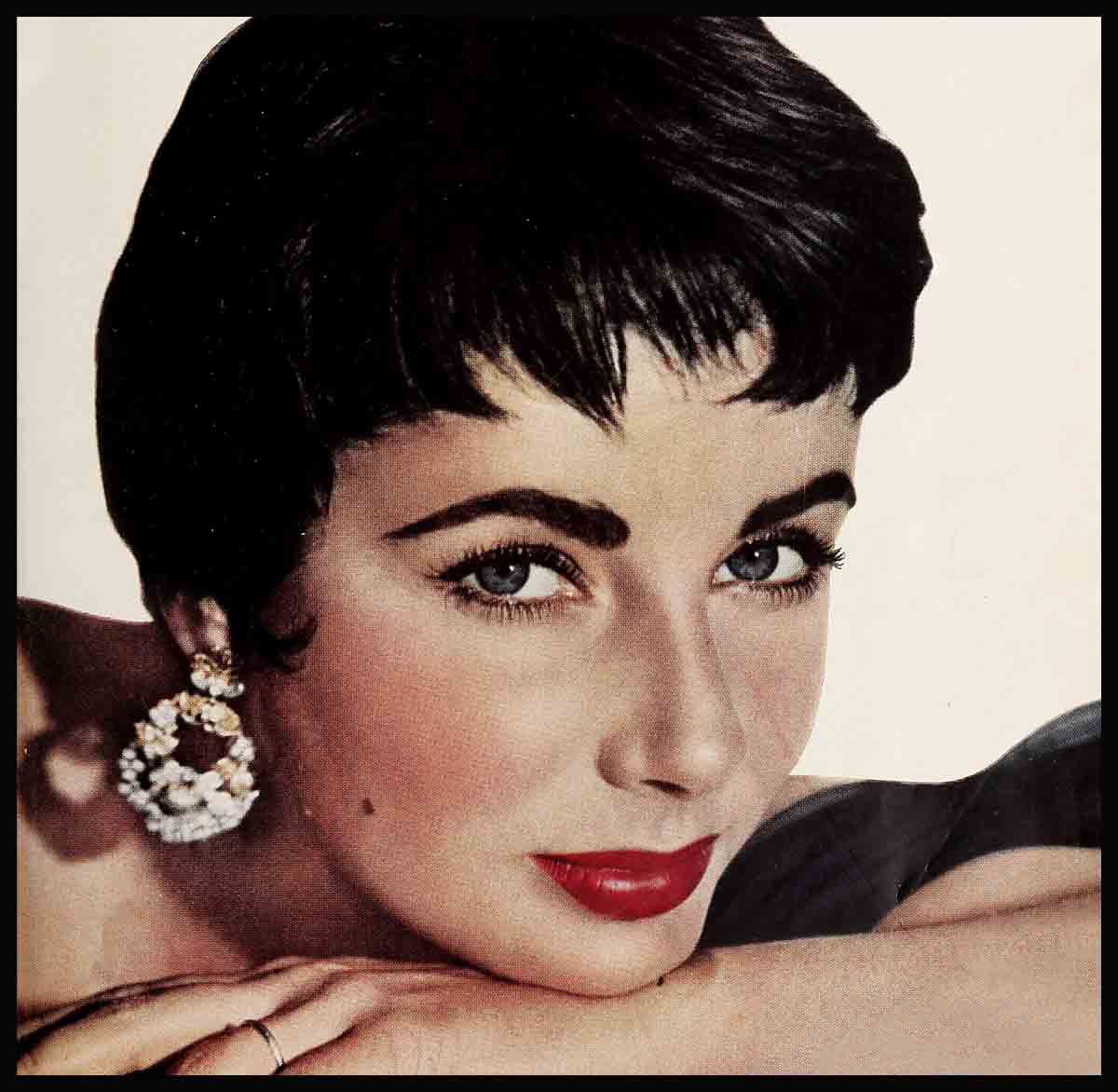
Time Of Trouble For Elizabeth Taylor?
Lazy as they like to be, Mr. and Mrs. Michael Wilding were lounging peacefully beside their pool. Mike went into the house for something or other, returned, sat down—and soared upward like the flying young man on the absent trapeze. He had sat on a bee, which took umbrage at the familiarity and expressed its displeasure with a direct hit. Maybe Mike sat a little gingerly for a few moments, but that’s all there was to it. A bee had stung him.
Except that a short time later another bee stung his child bride, and the next day she was bedridden, unable to walk on a badly swollen leg. Same sort of bee, same sort of sting, but while Mike had forgotten his injury in half an hour’s time, Liz could not have been more devastated by a machine gun bullet.
Which adds to the persistent and ubiquitous rumor that all is not well with Elizabeth Taylor. As the know-it-alls point out, she certainly has become fragile lately. In her childhood she was such a tomboy that admittedly she felt awkward and clumsy in feminine apparel. Romping about with her dogs, horses and chipmunks, she may not have been the most rugged kid on the block, but neither was she the most sickly. Her health didn’t start to fail, in fact, until her present marriage.
She was on a holiday tour with Michael and the baby last year when she suffered what has been variously described as a heart attack, a heart cramp, a nervous heart, an undiagnosed nervous condition affecting her back, and complete nervous exhaustion. To the realistic, it didn’t make sense. Something was wrong with Liz, but what? As the Wildings are not a fanatically athletic couple, it was hardly likely that she had overdone physically. And how could a vacation trip cause complete nervous exhaustion? It seemed odd—if she was happy.
Back home and at work in Rhapsody, Liz sustained a leg ailment which necessitated its being placed in a cast. There was no cause for real alarm, apparently, but production on the picture had to be held up because the injury inexplicably refused to mend.
Now Liz is suffering, “but not seriously,” from hepatitis. Anyone with hepatitis has a serious liver condition. The charm and beauty of Elizabeth cannot except her. So maybe it’s psychosomatic, suggest some. Maybe it’s pseudo-hepatitis brought on by the fact that she’s desperately unhappy.
ADD NASTY STORIES. A busybody on the MGM lot reports an unmistakable warmth in Liz’ attitude toward a certain handsome young man under contract to that studio. Just flirting, perhaps, teasing a little—but isn’t it significant that this gentleman is much closer to Miss Taylor’s own age than her husband is?
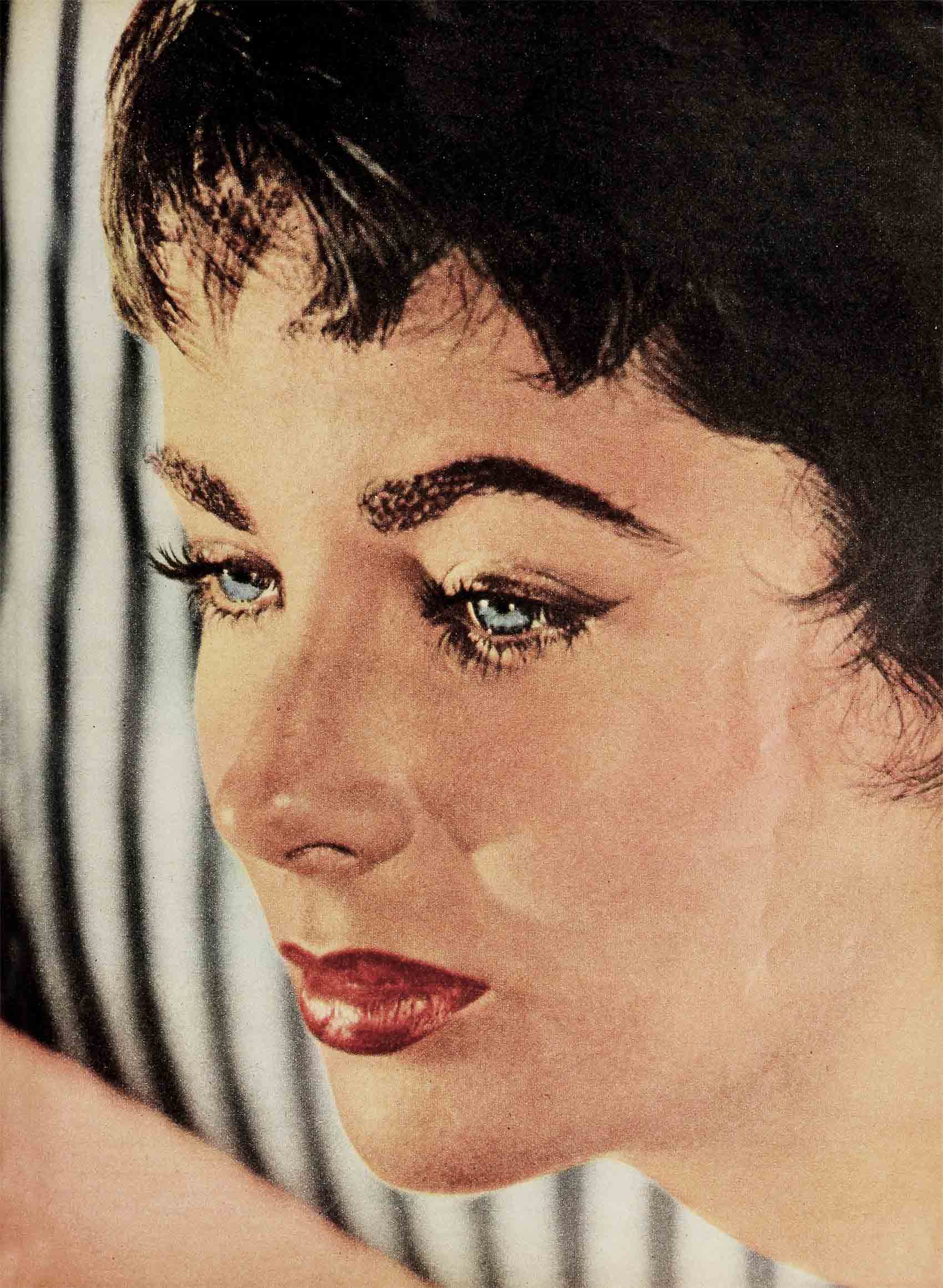
“Sure, she’s making eyes at some other guy,” say those who consider it a privilege to cast the first stone, “and it’s long overdue. Look at the record.”
Well, let’s look at the record, in honesty and fairness to the girl. Liz was seventeen, not even graduated from the studio high school, when she met Lt. Glenn Davis. They were in love or not, depending on how you look at it. Liz says it was hero-worship and, being a gentleman, Glenn says nothing—but a full-page picture of one of their embraces in Life magazine said a mouthful. And Mrs. Francis Taylor, in a story about her daughter, wrote, “That September Elizabeth was sent to England for The Conspirator. She wrote Glenn every night and never went out on a date the five months we were there.” If that isn’t love, there are plenty of Hollywoodites who would accept it gladly as a substitute.
Unfortunately, however, in pursuit of his Army duties, Lt. Davis went too far and stayed too long. In one of his absences she met a handsome and wealthy young man named Bill Pawley in Florida, and her dancing heart was gone again. Bill was on his way to.the West Coast to see her again before Liz faced up to the fact that Glenn had to be told. He must have been astonished to find himself in the position of the rejected suitor, not having known that he had any competition, but Glenn retired from the field gracefully and without recrimination.
The engagement of Liz and Bill was announced on June 7, 1949. Three months later, at the request of his fiancée, Mr. Pawley, Jr., announced that the engagement was oft. An optimistic lad, he hoped that the new arrangement was only temporary. Yes, they were in love. The problem was that his work kept him in the Hast while Liz labored in Hollywood—a full continent away. He hoped that things could be worked out, Bill told the press. They couldn’t. The truth is that he wanted her to give up her career and live in Florida, his home. Possibly in the first blush of romance the picture looked rosy, but within three months Liz showed a marked reluctance to part with California, career and limelight. She couldn’t promise and, since Bill couldn’t be dissuaded from his conviction that a wife’s place is with her husband, the engagement was off.
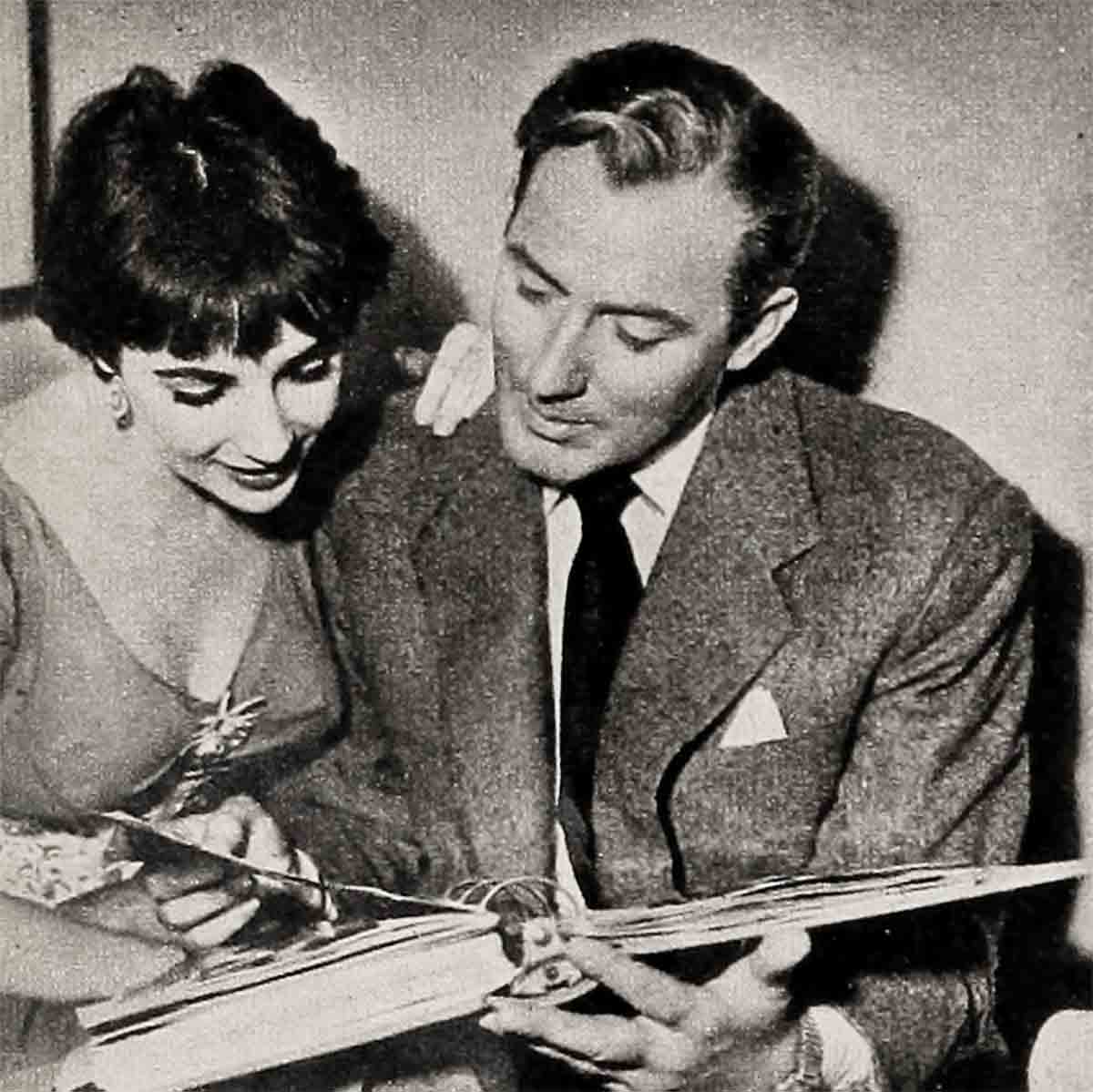
It was at this point that the London Sunday Pictorial suggested someone “should administer a series of resounding smacks behind the bustle of (Liz’) latest Paris creation” for silly and irresponsible behavior. For the first time in her young life Elizabeth Taylor was getting a bad press, particularly notable because it was a British newspaper taking her to task. Having spent the first eight years of her life in England, she had always been a favorite daughter.
When you look at the record, she hadn’t done anything so terrible. She had been engaged twice, and twice she had disengaged herself when it became clear that happiness lay in some other direction. Is that wrong? Should she instead have allowed each romance to reach its ultimate end in marriage, becoming a two-time loser in the divorce courts before she was out of her teens? It seems bad enough to make a mistake without deliberately compounding the error, which Liz would have done if she hadn’t backed away from those two early engagements.
A month after the Pawley situation had been disposed of, Liz met Nicky Hilton and did not fall in love at first sight. Liz was growing cautious, as well she might, since Hollywood’s reaction to her third engagement was, “Oh, really? And who’s next?” She was wary, she wanted to be sure, and Nicky courted her a full eight months.
At that time Liz told no less a reliable source than Louella O. Parsons. “There is no doubt in my mind that he is the one I want to spend my life with. Since we met we have never had one quarrel, one moment of misunderstanding. Every day I love him better.” They were married on May 6, 1950, in the Beverly Hills Church of the Good Shepherd. Liz had even begun taking instruction in the Catholic faith because Nicky is a Catholic.
The Hiltons’ blissful state of mutual understanding must have ended a day or so First reports from Europe, where they honeymooned, were that the youngsters’ marriage didn’t have a ghost of a chance. By the time they came home, it looked pretty much confirmed; Liz had lost too much weight, was overtly miserable, and the usually affable Nicky had turned surly, difficult.
People immediately and inevitably took sides. “Nicky is a spoiled brat,” said the Taylor camp. “Even on their honeymoon he left her alone while he drank and gambled and chased around. He used language abusive enough to crush a sensitive girl like Liz.”
To which the Hilton retinue retorted, “Nobody’s denying that Nick is headstrong or even spoiled. But he’s also a very intelligent guy, and she’s only beautiful. There’s nothing below the beautiful surface. He probably went out because he was bored silly.” Cruel words, accusing them both, helping them not at all.
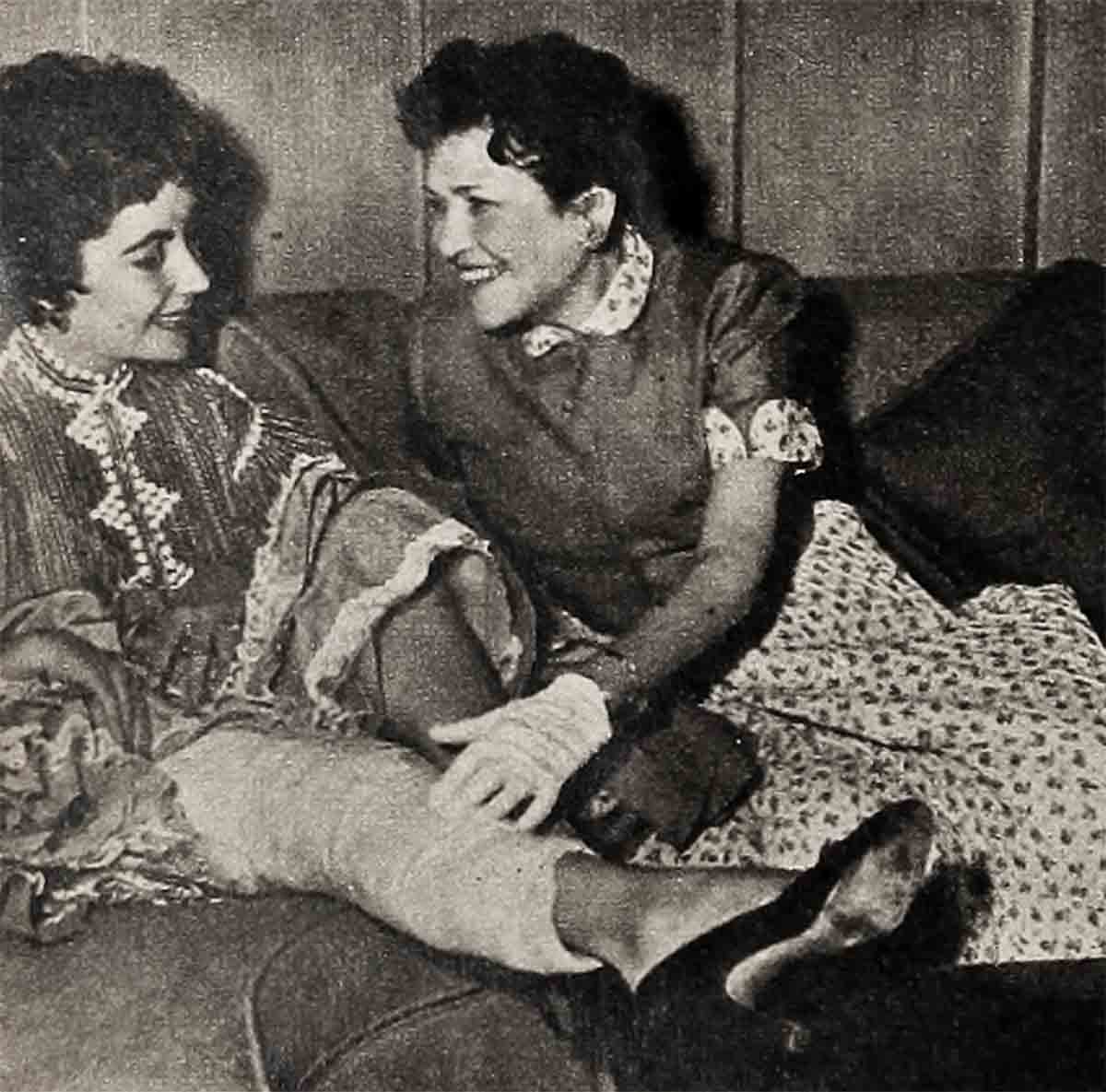
The doom-shaped pattern was unfolding. In October Liz Taylor went to Palm Springs alone “to rest,” denying that she had had another fight with Nicky or that she intended to give up her career in an attempt to save her marriage. “My husband has no objection to my career,” she said then. “We are very happy.”
Yet, within four weeks, she filed suit for divorce after a little more than six months of marriage. The charge was cruelty, which covers a multitude of sins and nobody knows how much heartbreak. By her own admission, Liz cried for days and nights on end after receiving her interlocutory decree. Was it the right thing to do? She didn’t know, and apparently Nicky didn’t, either, because two months after that initial decree was granted, the manager of the Thunderbird Hotel in Las Vegas reported that Liz and Nicky were there, dining and dancing, holding hands and kissing for all the world to see.
They got together still another time before it was all over. That October Hollywood was rocked by the news that Elizabeth Taylor, accompanied by Nick’s brother, was flying to Houston to see her erstwhile husband. “It’s news to me,” Nick said with a poker-faced shrug. “I’m here on a business trip.” But when Liz was bedded down with a cold in New York and unable to make the trip, he flew up to keep the rendezvous.
“Liz is emotionally upset by rumors that Nicky is engaged to Betsy von Furstenberg and will marry her as soon as the divorce is final,” said a New York representative of MGM. Assuming that it was true, there was still nothing to get upset about. Miss Von Furstenberg has been engaged to practically every eligible male in the American theatre without having once been brought to altar.
The story was not allowed to be true, however. MGM’s West Coast office rushed into print to deny it and said, instead, that Liz and Nicky were meeting to discuss a property settlement. It was a likely story, except that there was no property to discuss. Liz had already said she wanted nothing from Nicky other than a divorce. What’s more, Nicky’s father had given her a huge chunk of Hilton Hotel stock for a wedding present.
The odds are that the two confused kids got together to talk about a possible reconcilation one last time. Who knows, except the people involved? All the world knows is that if such was their intention, someone’s proud neck still refused to bow.
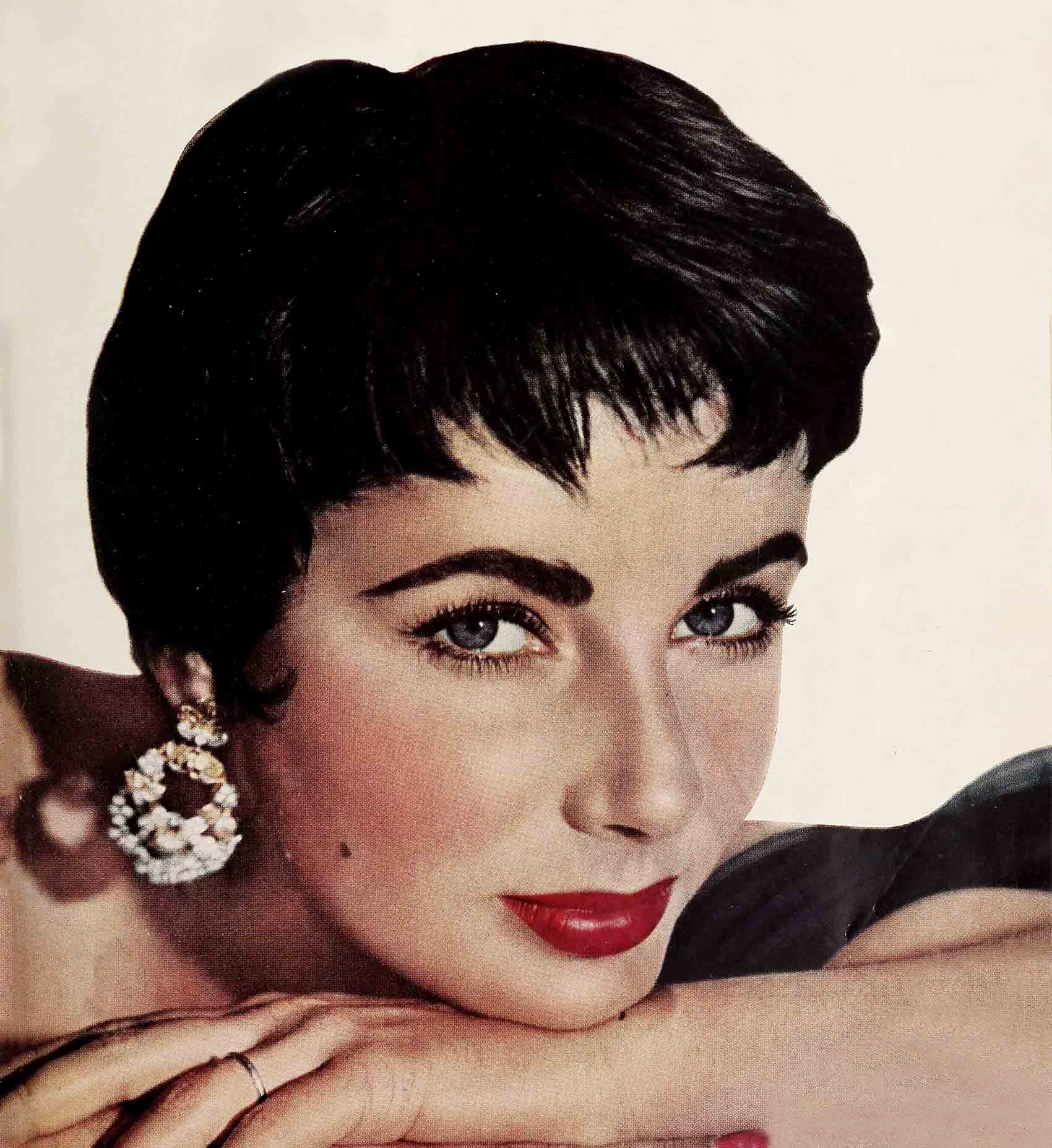
This was the most trying year of her life for little Elizabeth Taylor. She went home to her family when she left Nicky Hilton, then moved away into an apartment of her own. Talk around town was that the breach between the Taylors was a bad one, which Liz refused to dignify with either a confirmation or a denial. “I moved out because I have to learn to rely on myself, to make my own decisions,” she said. “I have to grow up some time, don’t I?”
Judging from the defiant and often childish statements she made in the months that followed, Liz didn’t grow up very much. She said, “Nicky was a big mistake. I think the idea of a June wedding appealed to me more than anything.” Having been married in May, that is.
And she said, “Nick and I had a fairytale courtship. Then, after the marriage, we weren’t on our good behavior any more, and we found out that we didn’t even like each other very well. . . . Two weeks after the wedding I knew I had made a mistake—but it was a beautiful wedding, wasn’t it?” Yup, just like in the movies.
And she said of Stanley Donen, “We’re good pals. We’re together constantly, and we’re good for each other. But it isn’t love.” Why, then, did the columnists find it necessary to rebuke them in print for the amount of necking they did in public?
And she uttered one truism that will live forever. She said, “I’ve been able to wear a plunging neckline since I was fourteen years old, and ever since then people have expected me to act as old as I look. My trouble all started because I have a woman’s body and a child’s emotions.” In the case of Liz Taylor that remark was either astute or instinctive self-analysis, but it could also be made, incidentally, about actresses considerably older.
Liz had fallen into the trap laid for unwary, unhappy celebrities. Trusting as a puppy, she gave interviews far and wide, and every time she opened her mouth, something wrong came out in print. When she decided—or was advised—to stop talking, she got hurt another way, because any star who refuses to discuss personal problems is automatically tagged “temperamental.”
Granted, her marriage to Nick Hilton was a bad mistake. Liz has always acknowledged more than her share of blame for the failure. “I thought I was mature enough to cope with marriage, and I wasn’t. I had always had my own way. Instead of pointing out my faults, people always told me how good I was. I never learned responsibility.” And after the breakup, she erred further in expressing herself too freely. But Liz had never been through the Hollywood marriage mill before—how was she to know?
Through the mistakes she learned about responsibility—and humiliation and heartache. In her brief marriage she learned that she couldn’t be emotionally dependent on Nicky, because he was equally immature. Then she went home to her family and was startled to discover that the role of baby daughter no longer fitted. She could no longer give her life blindly into the hands of her parents. No more a child, no more a wife, she had to go forward. Liz went out and rented an apartment of her own—for precisely the reasons she gave: she had to learn independence. “That incredible child” was growing up in self-defense.
Shortly after her final meeting with Nicky in New York, Liz was shipped off to England again to portray Rebecca in Ivanhoe. Indicative of her emotional growth, this time she was accompanied by her secretary instead of her mother. It caused no stress within the family, rumors to the contrary. The Taylors understood and accepted that their daughter must stand or fall alone.
She fell—like a plummet—at the feet of a sweet, shy, sensitive fellow named Michael Wilding. This, curiously, was their second encounter. Mrs. Taylor, in writing of the five-month sojourn in London when Liz was seventeen, spoke of their meeting and added, “I knew that except for Glenn, the man in Elizabeth’s life would be Michael Wilding.” This time there were no “excepts” or “ifs.” Liz was ready to know adult emotion.
Way back when she was seventeen, Mike had said lightly, “Some day you should marry me, you know,” and now he said, “You see? I told you, you should have waited for me!”
When word of their love leaked out, it was received with almost universal skepticism. They were totally different from each other. Mike was twice Elizabeth’s age. He was a man already settled while she still had a dainty fistful of wild oats to sow. This was going to be murder. Too bad—and he was such a nice guy, too.
A few people believed in them. One was Michael Wilding, who said, “She wants to be married to someone who will love and protect her, and that someone—by some heaven-sent luck—turns out to be me. I won’t let her down.”
His best friends, the Stewart Grangers, believed and gave them courage. After all, Jean Simmons’ beloved Jimmy is sixteen years older than she, and Hollywood cynicism has used a battering-ram on their marriage with absolutely no effect.
Elizabeth Taylor believed—in all but her own good fortune. Michael loved her. She told reporters, “I want to be married as quickly as possible, because happiness is a fragile thing, and we have so little time for it.” She had yet to be convinced that happiness isn’t a sometimes thing, but she had found the man who could give her whatever there was of it.
Liz and Mike Wilding have now been married almost three years. Career-wise, if Mike’s child-wife soars any higher, she’s going to be lost in a cloud. His own reputation as an actor’s actor grows more solid every day. They have the baby boy of their dreams, and the world’s warmest welcome is extended to any brothers and sisters who might join young Michael Howard in the house. And they have each other, Liz and Mike. Seeing them together, it’s plain that they still have each other so utterly and completely that if there is trouble, it will have to come from something outside this marriage.
We hope there is nothing—ever. We hope that Liz Taylor’s times of trouble are all behind her.
THE END
—BY ELLEN JOHNSON
It is a quote. MODERN SCREEN MAGAZINE OCTOBER 1954




